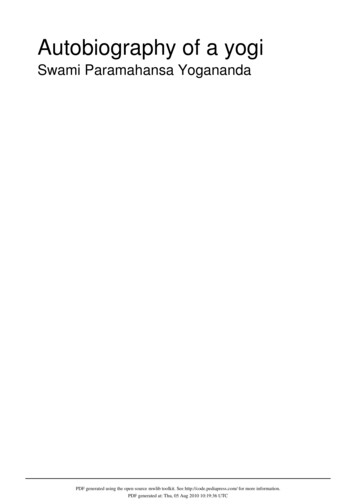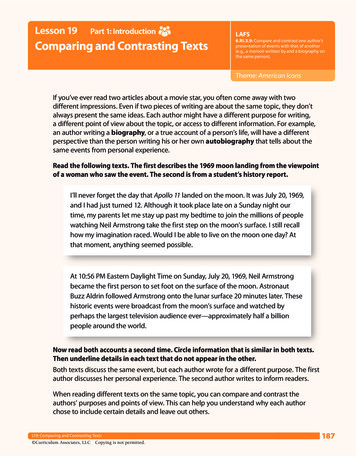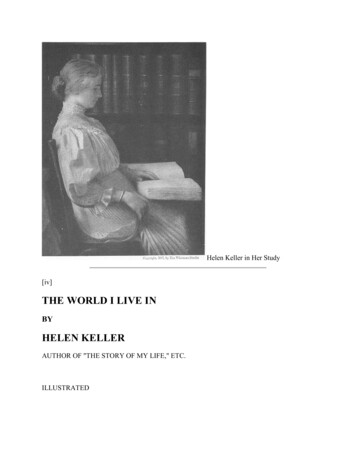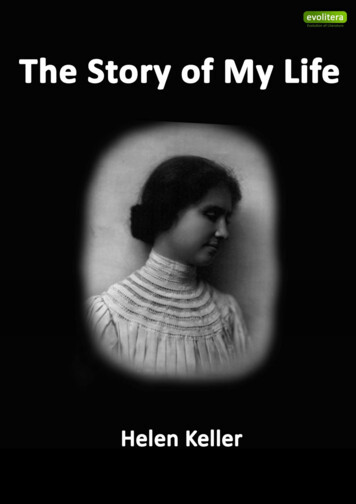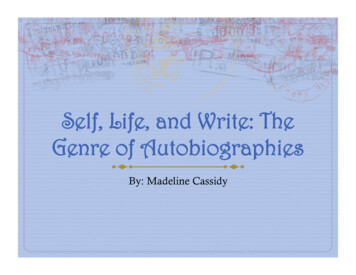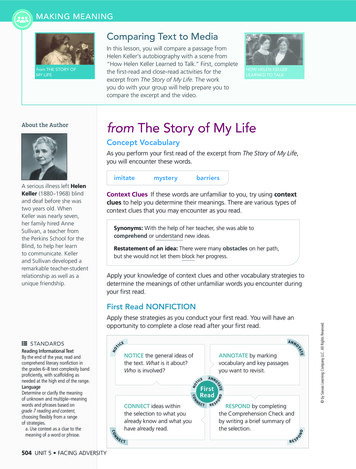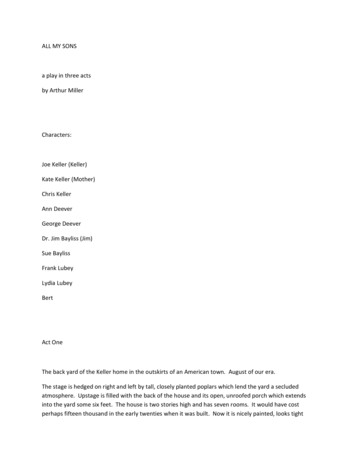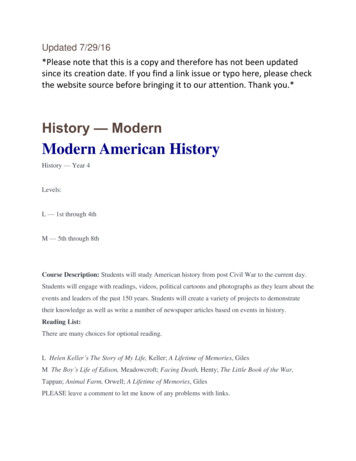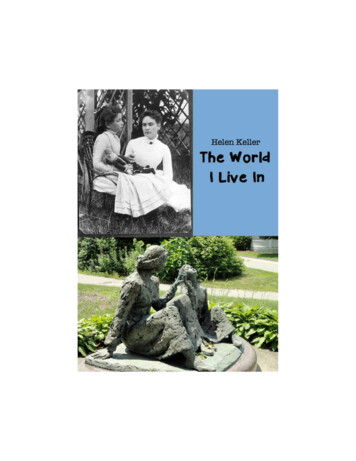
Transcription
THE WORLD I LIVE IN[ii]HELEN KELLER"The autobiography of Helen Keller isunquestionably one of the most remarkablerecords ever published."—British Weekly."This book is a human document of intenseinterest, and without a parallel, we suppose, inthe history of literature."—Yorkshire Post."Miss Keller's autobiography, well writtenand full of practical interest in all sides of life,literary, artistic and social, records �Times."This book is a record of the miraculous.No one can read it without being profoundlytouched by the patience and devotion whichbrought the blind, deaf-mute child into touchwith human life, without being filled withwonder at the quick intelligence which madesuch communication with the outside worldpossible."—Queen.Illustrated, price 7s. 6d.POPULAR EDITION, net, 1s.The Story of My LifeBy HELEN KELLER————The Practice of OptimismCloth, net, 1s. 6d.; paper, net, 1s.————LONDON: HODDER & STOUGHTON, E.C.[iii]
Helen Keller in Her StudyTHE WORLD I LIVE INBYHELEN KELLERAUTHOR OF "THE STORY OF MY LIFE," ETC.ILLUSTRATEDHODDER AND STOUGHTONLONDON NEW YORK TORONTO[iv]
Copyright 1904, 1908, by The Century Co.[v]TO[vi]HENRY H. ROGERSMY DEAR FRIEND OFMANY YEARSPREFACE[vii]THE essays and the poem in this book appeared originally in the "Century Magazine," theessays under the titles "A Chat About the Hand," "Sense and Sensibility," and "MyDreams." Mr. Gilder suggested the articles, and I thank him for his kind interest andencouragement. But he must also accept the responsibility which goes with my gratitude. For it isowing to his wish and that of other editors that I talk so much about myself.Every book is in a sense autobiographical. But while other self-recording creatures arepermitted at least to seem to change the subject, apparently nobody cares what I think of thetariff, the conservation of our natural resources, or the conflicts which revolve about the name ofDreyfus. If I offer to reform the education system of the world, my editorial friends say, "That isinteresting. But will you please tell us what idea you had of goodness and beauty when you weresix years old?" First they ask me to tell the life of the child who is mother to the woman. Thenthey make me my own daughter and ask for an account of grown-up sensations. Finally I amrequested to write about my dreams, and thus I become an anachronical grandmother; for it is thespecial privilege of old age to relate dreams. The editors are so kind that they are no doubt rightin thinking that nothing I have to say about the affairs of the universe would be interesting. Butuntil they give me opportunity to write about matters that are not-me, the world must go onuninstructed and unreformed, and I can only do my best with the one small subject upon which Iam allowed to discourse.[viii][ix]In "The Chant of Darkness" I did not intend to set up as a poet. I thought I was writing prose,except for the magnificent passage from Job which I was paraphrasing. But this part seemed tomy friends to separate itself from the exposition, and I made it into a kind of poem.H. K.CONTENTS[xi]CHAPTER IPAGETHE SEEING HANDCHAPTER IITHE HANDS OF OTHERS319
CHAPTER IIITHE HAND OF THE RACE33CHAPTER IVTHE POWER OF TOUCH45CHAPTER VTHE FINER VIBRATIONS63CHAPTER VISMELL, THE FALLEN ANGEL77CHAPTER VIIRELATIVE VALUES OF THE SENSES95CHAPTER VIIITHE FIVE - SENSED WORLD103CHAPTER IXINWARD VISIONS115[xii]CHAPTER XANALOGIES IN SENSE PERCEPTION 129CHAPTER XBEFORE THE SOUL DAWN141CHAPTER XIITHE LARGER SANCTIONS153CHAPTER XIIITHE DREAM WORLD169CHAPTER XIVDREAMS AND REALITY195CHAPTER XVA WAKING DREAM209A CHANT OF DARKNESS[xiii]229ILLUSTRATIONSHELEN KELLER IN HER STUDYFrontispieceTHE MEDALLIONFacing page 22"LISTENING" TO THE TREES"" 70THE LITTLE BOY NEXT DOOR"" 120[xv]
THE SEEING HAND[1]I[3]THE SEEING HANDIHAVE just touched my dog. He was rolling on the grass, with pleasure in every muscle andlimb. I wanted to catch a picture of him in my fingers, and I touched him as lightly as Iwould cobwebs; but lo, his fat body revolved, stiffened and solidified into an upright position,and his tongue gave my hand a lick! He pressed close to me, as if he were fain to crowd himselfinto my hand. He loved it with his tail, with his paw, with his tongue. If he could speak, I believehe would say with me that paradise is attained by touch; for in touch is all love and intelligence.This small incident started me on a chat about hands, and if my chat is fortunate I have tothank my dog-star. In any case, it is pleasant to have something to talk about that no one else hasmonopolized; it is like making a new path in the trackless woods, blazing the trail where no foothas pressed before. I am glad to take you by the hand and lead you along an untrodden way into aworld where the hand is supreme. But at the very outset we encounter a difficulty. You are soaccustomed to light, I fear you will stumble when I try to guide you through the land of darknessand silence. The blind are not supposed to be the best of guides. Still, though I cannot warrantnot to lose you, I promise that you shall not be led into fire or water, or fall into a deep pit. If youwill follow me patiently, you will find that "there's a sound so fine, nothing lives 'twixt it andsilence," and that there is more meant in things than meets the eye.My hand is to me what your hearing and sight together are to you. In large measure we travelthe same highways, read the same books, speak the same language, yet our experiences aredifferent. All my comings and goings turn on the hand as on a pivot. It is the hand that binds meto the world of men and women. The hand is my feeler with which I reach through isolation anddarkness and seize every pleasure, every activity that my fingers encounter. With the dropping ofa little word from another's hand into mine, a slight flutter of the fingers, began the intelligence,the joy, the fullness of my life. Like Job, I feel as if a hand had made me, fashioned me togetherround about and moulded my very soul.In all my experiences and thoughts I am conscious of a hand. Whatever moves me, whateverthrills me, is as a hand that touches me in the dark, and that touch is my reality. You might aswell say that a sight which makes you glad, or a blow which brings the stinging tears to youreyes, is unreal as to say that those impressions are unreal which I have accumulated by means oftouch. The delicate tremble of a butterfly's wings in my hand, the soft petals of violets curling inthe cool folds of their leaves or lifting sweetly out of the meadow-grass, the clear, firm outline offace and limb, the smooth arch of a horse's neck and the velvety touch of his nose—all these,and a thousand resultant combinations, which take shape in my mind, constitute my world.Ideas make the world we live in, and impressions furnish ideas. My world is built of touchsensations, devoid of physical colour and sound; but without colour and sound it breathes andthrobs with life. Every object is associated in my mind with tactual qualities which, combined incountless ways, give me a sense of power, of beauty, or of incongruity: for with my hands I canfeel the comic as well as the beautiful in the outward appearance of things. Remember that you,dependent on your sight, do not realize how many things are tangible. All palpable things aremobile or rigid, solid or liquid, big or small, warm or cold, and these qualities are variouslymodified. The coolness of a water-lily rounding into bloom is different from the coolness of an[4][5][6][7][8]
evening wind in summer, and different again from the coolness of the rain that soaks into thehearts of growing things and gives them life and body. The velvet of the rose is not that of a ripepeach or of a baby's dimpled cheek. The hardness of the rock is to the hardness of wood what aman's deep bass is to a woman's voice when it is low. What I call beauty I find in certaincombinations of all these qualities, and is largely derived from the flow of curved and straightlines which is over all things."What does the straight line mean to you?" I think you will ask.[9]It means several things. It symbolizes duty. It seems to have the quality of inexorableness thatduty has. When I have something to do that must not be set aside, I feel as if I were goingforward in a straight line, bound to arrive somewhere, or go on forever without swerving to theright or to the left.That is what it means. To escape this moralizing you should ask, "How does the straight linefeel?" It feels, as I suppose it looks, straight—a dull thought drawn out endlessly. Eloquence tothe touch resides not in straight lines, but in unstraight lines, or in many curved and straight linestogether. They appear and disappear, are now deep, now shallow, now broken off or lengthenedor swelling. They rise and sink beneath my fingers, they are full of sudden starts and pauses, andtheir variety is inexhaustible and wonderful. So you see I am not shut out from the region of thebeautiful, though my hand cannot perceive the brilliant colours in the sunset or on the mountain,or reach into the blue depths of the sky.Physics tells me that I am well off in a world which, I am told, knows neither cold nor sound,but is made in terms of size, shape, and inherent qualities; for at least every object appears to myfingers standing solidly right side up, and is not an inverted image on the retina which, Iunderstand, your brain is at infinite though unconscious labour to set back on its feet. A tangibleobject passes complete into my brain with the warmth of life upon it, and occupies the same placethat it does in space; for, without egotism, the mind is as large as the universe. When I think ofhills, I think of the upward strength I tread upon. When water is the object of my thought, I feelthe cool shock of the plunge and the quick yielding of the waves that crisp and curl and rippleabout my body. The pleasing changes of rough and smooth, pliant and rigid, curved and straightin the bark and branches of a tree give the truth to my hand. The immovable rock, with its jutsand warped surface, bends beneath my fingers into all manner of grooves and hollows. The bulgeof a watermelon and the puffed-up rotundities of squashes that sprout, bud, and ripen in thatstrange garden planted somewhere behind my finger-tips are the ludicrous in my tactual memoryand imagination. My fingers are tickled to delight by the soft ripple of a baby's laugh, and findamusement in the lusty crow of the barnyard autocrat. Once I had a pet rooster that used to perchon my knee and stretch his neck and crow. A bird in my hand was then worth two in the—barnyard.My fingers cannot, of course, get the impression of a large whole at a glance; but I feel theparts, and my mind puts them together. I move around my house, touching object after object inorder, before I can form an idea of the entire house. In other people's houses I can touch onlywhat is shown to me—the chief objects of interest, carvings on the wall, or a curiousarchitectural feature, exhibited like the family album. Therefore a house with which I am notfamiliar has for me, at first, no general effect or harmony of detail. It is not a completeconception, but a collection of object-impressions which, as they come to me, are disconnectedand isolated. But my mind is full of associations, sensations, theories, and with them it constructsthe house. The process reminds me of the building of Solomon's temple, where was neither saw,nor hammer, nor any tool heard while the stones were being laid one upon another. The silentworker is imagination which decrees reality out of chaos.Without imagination what a poor thing my world would be! My garden would be a silentpatch of earth strewn with sticks of a variety of shapes and smells. But when the eye of my mindis opened to its beauty, the bare ground brightens beneath my feet, and the hedge-row bursts into[10][11][12][13][14]
leaf, and the rose-tree shakes its fragrance everywhere. I know how budding trees look, and Ienter into the amorous joy of the mating birds, and this is the miracle of imagination.Twofold is the miracle when, through my fingers, my imagination reaches forth and meets theimagination of an artist which he has embodied in a sculptured form. Although, compared withthe life-warm, mobile face of a friend, the marble is cold and pulseless and unresponsive, yet it isbeautiful to my hand. Its flowing curves and bendings are a real pleasure; only breath is wanting;but under the spell of the imagination the marble thrills and becomes the divine reality of theideal. Imagination puts a sentiment into every line and curve, and the statue in my touch isindeed the goddess herself who breathes and moves and enchants.It is true, however, that some sculptures, even recognized masterpieces, do not please myhand. When I touch what there is of the Winged Victory, it reminds me at first of a headless,limbless dream that flies towards me in an unrestful sleep. The garments of the Victory thruststiffly out behind, and do not resemble garments that I have felt flying, fluttering, folding,spreading in the wind. But imagination fulfils these imperfections, and straightway the Victorybecomes a powerful and spirited figure with the sweep of sea-winds in her robes and thesplendour of conquest in her wings.[15][16]I find in a beautiful statue perfection of bodily form, the qualities of balance andcompleteness. The Minerva, hung with a web of poetical allusion, gives me a sense ofexhilaration that is almost physical; and I like the luxuriant, wavy hair of Bacchus and Apollo,and the wreath of ivy, so suggestive of pagan holidays.So imagination crowns the experience of my hands. And they learned their cunning from thewise hand of another, which, itself guided by imagination, led me safely in paths that I knew not,made darkness light before me, and made crooked ways straight.THE HANDS OF OTHERS[17]II[19]THE HANDS OF OTHERSTHE warmth and protectiveness of the hand are most homefelt to me who have alwayslooked to it for aid and joy. I understand perfectly how the Psalmist can lift up his voicewith strength and gladness, singing, "I put my trust in the Lord at all times, and his hand shalluphold me, and I shall dwell in safety." In the strength of the human hand, too, there issomething divine. I am told that the glance of a beloved eye thrills one from a distance; but there[20]is no distance in the touch of a beloved hand. Even the letters I receive are—Kind letters that betray the heart's deep history,In which we feel the presence of a hand.It is interesting to observe the differences in the hands of people. They show all kinds ofvitality, energy, stillness, and cordiality. I never realized how living the hand is until I saw thosechill plaster images in Mr. Hutton's collection of casts. The hand I know in life has the fullnessof blood in its veins, and is elastic with spirit. How different dear Mr. Hutton's hand was from itsdull, insensate image! To me the cast lacks the very form of the hand. Of the many casts in Mr.Hutton's collection I did not recognize any, not even my own. But a loving hand I never forget. I[21]
remember in my fingers the large hands of Bishop Brooks, brimful of tenderness and a strongman's joy. If you were deaf and blind, and could have held Mr. Jefferson's hand, you would haveseen in it a face and heard a kind voice unlike any other you have known. Mark Twain's hand isfull of whimsies and the drollest humours, and while you hold it the drollery changes tosympathy and championship.I am told that the words I have just written donot "describe" the hands of my friends, but merelyendow them with the kindly human qualities whichI know they possess, and which language conveysin abstract words. The criticism implies that I amnot giving the primary truth of what I feel; buthow otherwise do descriptions in books I read,written by men who can see, render the visiblelook of a face? I read that a face is strong, gentle;that it is full of patience, of intellect; that it is fine,sweet, noble, beautiful. Have I not the same rightto use these words in describing what I feel as youhave in describing what you see? They expresstruly what I feel in the hand. I am seldomconscious of physical qualities, and I do notremember whether the fingers of a hand are shortor long, or the skin is moist or dry. No more canyou, without conscious effort, recall the details ofa face, even when you have seen it many times. Ifyou do recall the features, and say that an eye isblue, a chin sharp, a nose short, or a cheek sunken,I fancy that you do not succeed well in giving theimpression of the person,—not so well as whenyou interpret at once to the heart the essentialmoral qualities of the face—its humour, gravity,sadness, spirituality. If I should tell you in physicalterms how a hand feels, you would be no wiser formy account than a blind man to whom youdescribe a face in detail. Remember that when aThe Medallionblind man recovers his sight, he does notThe bas-relief on the wall is a portrait of recognize the commonest thing that has beenthe Queen Dowager of Spain, which Her familiar to his touch, the dearest face intimate toMajesty had made for Miss Kellerhis fingers, and it does not help him at all thatTo face page 22things and people have been described to himagain and again. So you, who are untrained oftouch, do not recognize a hand by the grasp; and so, too, any description I might give would failto make you acquainted with a friendly hand which my fingers have often folded about, andwhich my affection translates to my memory.I cannot describe hands under any class or type; there is no democracy of hands. Some handstell me that they do everything with the maximum of bustle and noise. Other hands are fidgetyand unadvised, with nervous, fussy fingers which indicate a nature sensitive to the little pricks ofdaily life. Sometimes I recognize with foreboding the kindly but stupid hand of one who tellswith many words news that is no news. I have met a bishop with a jocose hand, a humourist witha hand of leaden gravity, a man of pretentious valour with a timorous hand, and a quiet,apologetic man with a fist of iron. When I was a little girl I was taken to see[A] a woman whowas blind and paralysed. I shall never forget how she held out her small, trembling hand andpressed sympathy into mine. My eyes fill with tears as I think of her. The weariness, pain,[22][23][24][25]
darkness, and sweet patience were all to be felt in her thin, wasted, groping, loving hand.Few people who do not know me will understand, I think, how much I get of the mood of afriend who is engaged in oral conversation with somebody else. My hand follows his motions; Itouch his hand, his arm, his face. I can tell when he is full of glee over a good joke which has notbeen repeated to me, or when he is telling a lively story. One of my friends is rather aggressive,and his hand always announces the coming of a dispute. By his impatient jerk I know he hasargument ready for some one. I have felt him start as a sudden recollection or a new idea shotthrough his mind. I have felt grief in his hand. I have felt his soul wrap itself in darknessmajestically as in a garment. Another friend has positive, emphatic hands which show greatpertinacity of opinion. She is the only person I know who emphasizes her spelled words andaccents them as she emphasizes and accents her spoken words when I read her lips. I like thisvaried emphasis better than the monotonous pound of unmodulated people who hammer theirmeaning into my palm.Some hands, when they clasp yours, beam and bubble over with gladness. They throb andexpand with life. Strangers have clasped my hand like that of a long-lost sister. Other peopleshake hands with me as if with the fear that I may do them mischief. Such persons hold out civilfinger-tips which they permit you to touch, and in the moment of contract they retreat, andinwardly you hope that you will not be called upon again to take that hand of "dormouse valour."It betokens a prudish mind, ungracious pride, and not seldom mistrust. It is the antipode to thehand of those who have large, lovable natures.The handshake of some people makes you think of accident and sudden death. Contrast thisill-boding hand with the quick, skilful, quiet hand of a nurse whom I remember with affectionbecause she took the best care of my teacher. I have clasped the hands of some rich people thatspin not and toil not, and yet are not beautiful. Beneath their soft, smooth roundness what achaos of undeveloped character!I am sure there is no hand comparable to the physician's in patient skill, merciful gentlenessand splendid certainty. No wonder that Ruskin finds in the sure strokes of the surgeon theperfection of control and delicate precision for the artist to emulate. If the physician is a man ofgreat nature, there will be healing for the spirit in his touch. This magic touch of well-being wasin the hand of a dear friend of mine who was our doctor in sickness and health. His happycordial spirit did his patients good whether they needed medicine or not.[26][27][28][29]As there are many beauties of the face, so the beauties of the hand are many. Touch has itsecstasies. The hands of people of strong individuality and sensitiveness are wonderfully mobile.In a glance of their finger-tips they express many shades of thought. Now and again I touch afine, graceful, supple-wristed hand which spells with the same beauty and distinction that youmust see in the handwriting of some highly cultivated people. I wish you could see how prettilylittle children spell in my hand. They are wild flowers of humanity, and their finger motions wildflowers of speech.All this is my private science of palmistry, and when I tell your fortune it is by no mysteriousintuition or gipsy witchcraft, but by natural, explicable recognition of the embossed character inyour hand. Not only is the hand as easy to recognize as the face, but it reveals its secrets moreopenly and unconsciously. People control their countenances, but the hand is under no suchrestraint. It relaxes and becomes listless when the spirit is low and dejected; the muscles tightenwhen the mind is excited or the heart glad; and permanent qualities stand written on it all thetime.[30][31]
THE HAND OF THE RACEIII[33]THE HAND OF THE RACELOOK in your "Century Dictionary," or if you are blind, ask your teacher to do it for you,and learn how many idioms are made on the idea of hand, and how many words are formedfrom the Latin root manus—enough words to name all the essential affairs of life. "Hand," withquotations and compounds, occupies twenty-four columns, eight pages of this dictionary. Thehand is defined as "the organ of apprehension." How perfectly the definition fits my case in bothsenses of the word "apprehend"! With my hand I seize and hold all that I find in the three worlds [34]—physical, intellectual, and spiritual.Think how man has regarded the world in terms of the hand. All life is divided between whatlies on one hand and on the other. The products of skill are manufactures. The conduct of affairsis management. History seems to be the record—alas for our chronicles of war!—of themanœuvres of armies. But the history of peace, too, the narrative of labour in the field, the forest,and the vineyard, is written in the victorious sign manual—the sign of the hand that hasconquered the wilderness. The labourer himself is called a hand. In manacle and manumissionwe read the story of human slavery and freedom.The minor idioms are myriad; but I will not recall too many, lest you cry, "Hands off!" Icannot desist, however, from this word-game until I have set down a few. Whatever is not one'sown by first possession is second-hand. That is what I am told my knowledge is. But my wellmeaning friends come to my defence, and, not content with endowing me with natural first-handknowledge which is rightfully mine, ascribe to me a preternatural sixth sense and credit tomiracles and heaven-sent compensations all that I have won and discovered with my good righthand. And with my left hand too; for with that I read, and it is as true and honourable as theother. By what half-development of human power has the left hand been neglected? When wearrive at the acme of civilization shall we not all be ambidextrous, and in our hand-to-handcontests against difficulties shall we not be doubly triumphant? It occurs to me, by the way, thatwhen my teacher was training my unreclaimed spirit, her struggle against the powers of darkness,with the stout arm of discipline and the light of the manual alphabet, was in two senses a handto-hand conflict.No essay would be complete without quotations from Shakspere. In the field which, in thepresumption of my youth, I thought was my own he has reaped before me. In almost every playthere are passages where the hand plays a part. Lady Macbeth's heart-broken soliloquy over herlittle hand, from which all the perfumes of Arabia will not wash the stain, is the most pitifulmoment in the tragedy. Mark Antony rewards Scarus, the bravest of his soldiers, by askingCleopatra to give him her hand: "Commend unto his lips thy favouring hand." In a differentmood he is enraged because Thyreus, whom he despises, has presumed to kiss the hand of thequeen, "my playfellow, the kingly seal of high hearts." When Cleopatra is threatened with thehumiliation of gracing Cæsar's triumph, she snatches a dagger, exclaiming, "I will trust myresolution and my good hands." With the same swift instinct, Cassius trusts to his hands when hestabs Cæsar: "Speak, hands, for me!" "Let me kiss your hand," says the blind Gloster to Lear."Let me wipe it first," replies the broken old king; "it smells of mortality." How charged is thissingle touch with sad meaning! How it opens our eyes to the fearful purging Lear has undergone,to learn that royalty is no defence against ingratitude and cruelty! Gloster's exclamation about hisson, "Did I but live to see thee in my touch, I'd say I had eyes again," is as true to a pulse within[35][36][37][38]
me as the grief he feels. The ghost in "Hamlet" recites the wrongs from which springs thetragedy:Thus was I, sleeping, by a brother's hand.At once of life, of crown, of queen dispatch'd.How that passage in "Othello" stops your breath—that passage full of bitter double intentionin which Othello's suspicion tips with evil what he says about Desdemona's hand; and she ininnocence answers only the innocent meaning of his words: "For 'twas that hand that gave awaymy heart."[39]Not all Shakspere's great passages about the hand are tragic. Remember the light play ofwords in "Romeo and Juliet" where the dialogue, flying nimbly back and forth, weaves a prettysonnet about the hand. And who knows the hand, if not the lover?The touch of the hand is in every chapter of the Bible. Why, you could almost rewrite Exodusas the story of the hand. Everything is done by the hand of the Lord and of Moses. Theoppression of the Hebrews is translated thus: "The hand of Pharaoh was heavy upon theHebrews." Their departure out of the land is told in these vivid words: "The Lord brought thechildren of Israel out of the house of bondage with a strong hand and a stretched-out arm." Atthe stretching out of the hand of Moses the waters of the Red Sea part and stand all on a heap.When the Lord lifts his hand in anger, thousands perish in the wilderness. Every act, everydecree in the history of Israel, as indeed in the history of the human race, is sanctioned by thehand. Is it not used in the great moments of swearing, blessing, cursing, smiting, agreeing,marrying, building, destroying? Its sacredness is in the law that no sacrifice is valid unless thesacrificer lay his hand upon the head of the victim. The congregation lay their hands on the headsof those who are sentenced to death. How terrible the dumb condemnation of their hands must beto the condemned! When Moses builds the altar on Mount Sinai, he is commanded to use no tool,but rear it with his own hands. Earth, sea, sky, man, and all lower animals are holy unto the Lordbecause he has formed them with his hand. When the Psalmist considers the heavens and theearth, he exclaims: "What is man, O Lord, that thou art mindful of him? For thou hast made himto have dominion over the works of thy hands." The supplicating gesture of the hand alwaysaccompanies the spoken prayer, and with clean hands goes the pure heart.Christ comforted and blessed and healed and wrought many miracles with his hands. Hetouched the eyes of the blind, and they were opened. When Jairus sought him, overwhelmed withgrief, Jesus went and laid his hands on the ruler's daughter, and she awoke from the sleep ofdeath to her father's love. You also remember how he healed the crooked woman. He said to her,"Woman, thou art loosed from thine infirmity," and he laid his hands on her, and immediatelyshe was made straight, and she glorified God.[40][41][42]Look where we will, we find the hand in time and history, working, building, inventing,bringing civilization out of barbarism. The hand symbolizes power and the excellence of work.The mechanic's hand, that minister of elemental forces, the hand that hews, saws, cuts, builds, isuseful in the world equally with the delicate hand that paints a wild flower or moulds a Grecianurn, or the hand of a statesman that writes a law. The eye cannot say to the hand, "I have noneed of thee." Blessed be the hand! Thrice blessed be the hands that work!THE POWER OF TOUCH[43]
IV[45]THE POWER OF TOUCHSOME months ago, in a newspaper which announced the publication of the "Matilda ZieglerMagazine for the Blind," appeared the following paragraph:"Many poems and stories must be omitted because they deal with sight. Allusion tomoonbeams, rainbows, starlight, clouds, and beautiful scenery may not be pr
HELEN KELLER "The autobiography of Helen Keller is unquestionably one of the most remarkable records ever published."—British Weekly. "This book is a human document of intense interest, and without a parallel, we suppose, in the history of literature."—Yorkshire Post. "M
